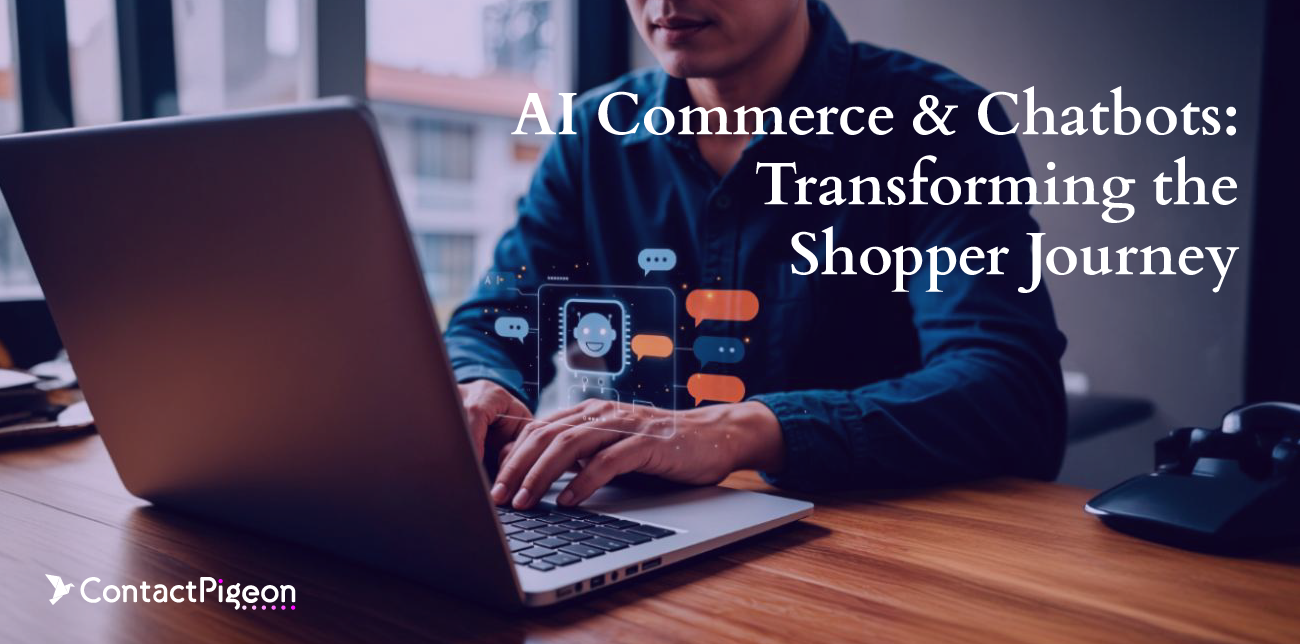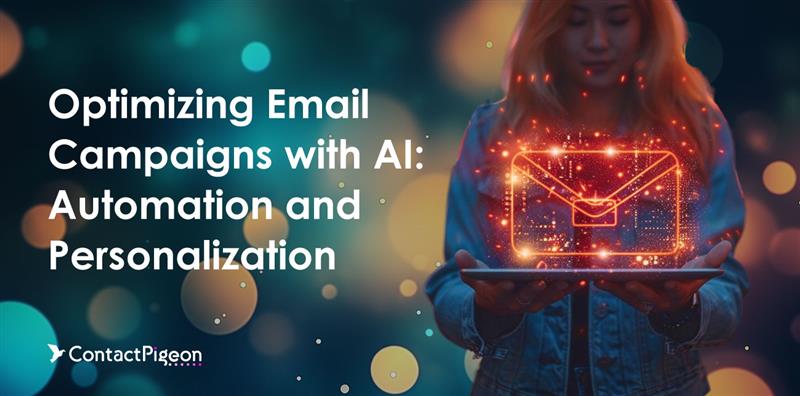Let’s allow the importance of retail customer engagement to sink in: When it comes to making a purchase, 64% of people find the customer experience to be more important than the price, according to Gartner Research. In a digital world where online shoppers are overwhelmed with choices, it is more important than ever to use a retail customer engagement platform that will convert potential clients into returning shoppers.
This rings even more true in the post-COVID-19 era when more people are opting to shop from the safety of their own homes, and, luckily, in 2022, very few businesses do not have online retail stores. Not to mention the number of social media platforms paired with these sites. However, out of 71% of consumers who want a consistent service experience, only 29% report that they’re getting it.
Ηopefully, companies are aware of this. According to PWC, more than 80% of the companies today invest in omnichannel engagement technologies, in order to stay ahead of the competition. Thus, as retail giants like Sephora, ZARA, or IKEA invest massively in omnichannel, a new threat is now visible for most businesses: the threat of staying behind.
But we know that the market is vast and it is impossible to find out where to begin. So we took the liberty of proactively bringing a solution to your problem. In this article, we will have a detailed discussion on how to choose the ideal omnichannel customer engagement platform and how this will improve your retail business’s revenue. Below, we will explore the capabilities and benefits of using an online solution, and ultimately, this will enable a business professional to find the proper software based on their company’s needs.
Table of Contents
- FAQs about customer engagement platforms you should read
- What is customer engagement in retail?
- What is a customer engagement platform?
- What is an omnichannel customer engagement platform?
- Choosing the right retail customer engagement platform for your enterprise
- Key Feature #1: Make sure you prioritize customer engagement solutions built for the retail industry
- Key Feature #2: Research the customer engagement platform’s customer reviews
- Key Feature #3: Make sure your future partner has a responsive customer support department
- Key Feature #4: Examine how omnichannel the customer engagement platform really is
- Key Feature #5: Examine the platform’s pricing, but also ask for a custom quote
- Key Feature #6: Examine what type of retail-focused customer engagement features they add and how frequently they add new applications
- Key Feature #7: Check what industry awards and distinctions your preferred solutions have won
- Choosing the right retail customer engagement solution
FAQs about customer engagement platforms you should read
Going for a retail customer engagement platform that will be 100% suitable for your business is no small feat, but not entirely impossible. Thus, before we get started, here is a bit of background information on customer engagement that you may find useful.
What is customer engagement in retail?
Customer engagement in retail is defined by how a business or brand interacts with clients and customers. This interaction is usually measured across multiple channels, such as online, in-store, and social media. It is a critical aspect of building a relationship with prospective customers, largely contributing to the success rate of a business and the nurturing of life-long clientele.
What is a customer engagement platform?
A customer engagement platform refers to the software used to assist companies in managing and optimizing their client care. This platform usually has a variety of engagement tools, which allow a business to collect customer data and offer a personalized shopping experience. This type of data usually includes clients’ social media activity, their order history, abandoned cart products, customer support tickets, and the devices they are using.
What is an omnichannel customer engagement platform?
An omnichannel customer engagement platform’s main focus is to increase customer engagement by executing seamless cross-channel communication and interactions. With an omnichannel platform, data is integrated to allow for a seamless and personalized user experience. Delivering meaningful engagement will form real brand-consumer relationships and will result in customer satisfaction, improved sales, and higher retention rates.
Choosing the right retail customer engagement platform for your enterprise
#1: Make sure you prioritize customer engagement solutions built for the retail industry
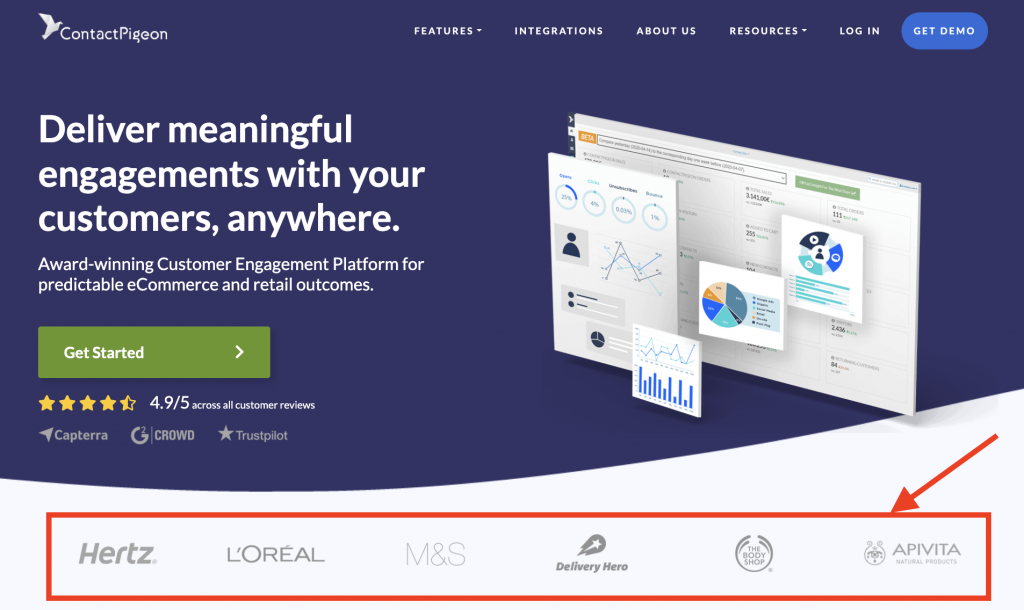
According to Research Live, almost 90% of leaders in the retail industry agree that a seamless omnichannel strategy is critical to success. The keyword here is retail. When searching for the ideal customer engagement platform, it is essential that you find the right fit for your business. The world of retail moves fast, with ever-changing data and trends. To remain successful in your field, it is essential that you find a platform that understands the ins and outs of managing data and engagement in the retail industry.
Where to focus:
- What clients do they have?
Look at what a business does, not what it says it can do. When looking for the perfect customer engagement platform fit, you have the full right to ask for references and a portfolio. Look at the clients that a platform has and decide if their strategies align with the engagement goals you have for your business. Ideally, if you are in retail, you will want the platform’s clients to be in retail, too. - Do they offer retail-focused features?
As mentioned before, retail is a whole different ball game. Unlike most websites for services or portfolios, retail businesses are fast-paced and very customer-orientated. When looking for a customer engagement partner, you want a platform that has mastered the art of staying on top of all things retail. (eg 2-way QR codes for an omnichannel campaign in physical retail stores) - Do they seem experienced in retail?
It is one thing to say you are knowledgeable in retail and another to actually have retail knowledge. When going through potential platforms, see if they are knowledgeable (ideally experts) in your field of work. Experts in retail likely blog about retail or have a newsletter that you can subscribe to. Start by distinguishing the real experts from the imposters.
Tip: Before closing this tab take a look at 30 examples on how to improve customer engagement in retail. This article gets hundreds of views per day and can provide tons of inspiration.
Dangers if you ignore it:
- “Mismatched” features
To make your business successful, a customer engagement platform’s features need to make sense. If the features do not align, it is not likely that the partnership will work. - Potentially uninteresting or non-beneficial future features
If the features that are likely to be offered in the future do not align with your business needs, it is best to move on.
#2: Research the customer engagement platform’s customer reviews
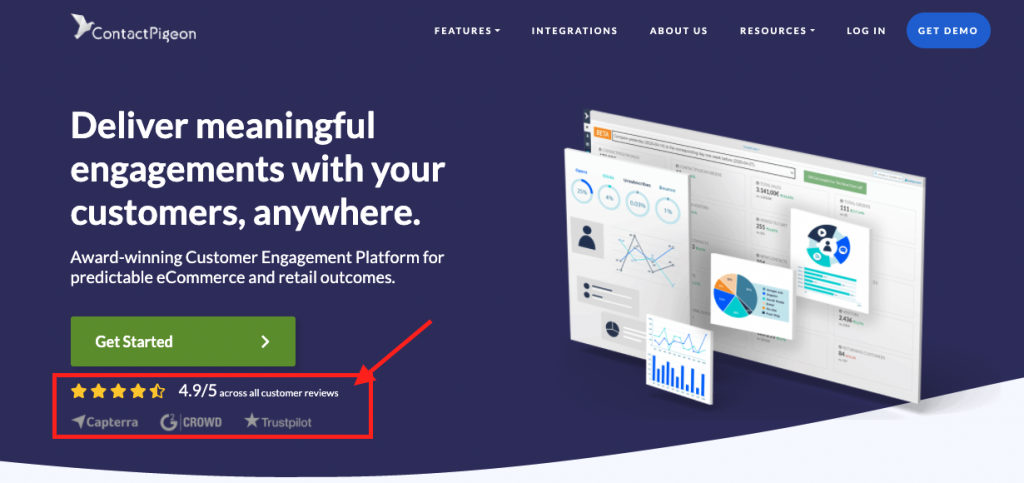
There’s a good reason why 85% of marketing executives say that “significantly more” of their marketing decisions will be based on analytics in 2022: Statistics do not lie. The same goes for reviews. When you’re looking for a customer engagement platform for your business, it is essential to thoroughly research the platform’s reviews. This is the ideal place to see if like-minded businesses have found the platform useful and if you should approach the platform for a quote.
Where to focus:
- The types of comments satisfied customers are making and the pain points they have solved
It is important to read the content of the reviews, instead of just the star rating. Scan the company’s customer reviews across all channels (on-site, social media accounts, software comparison sites, etc) and then go through the comments to see if they reflect your own business’s needs and if your business can benefit from the same solutions other customers did.
Tip: Top software comparison platforms have advanced review submission processes that can’t be tricked, thus the approved reviews are reliable. For example, at G2 that ContactPigeon has 4.9/5 av. customer ratings, you can be 100% sure this number is real since the submission process asks for LinkedIn validation and it’s also strictly monitored by moderators. - The average ratio across platforms
One five-star review compared to 10 one-star reviews simply won’t make the cut. When looking for your ideal business fit, ensure that you go through as many reviews as possible. Look at what the overall average is, and check multiple review platforms. When reading comments, also look out for spammers or bots. Unfortunately, many businesses attempt to boost their ratings by leaving fake reviews and comments. When looking at comments on, for example, Google Reviews, check whether glowing reviews are connected to a real profile.
- Any repetitive negative reviews over a specific matter
With that said, always take negative reviews with a grain of salt. If there is only one one-star review in a sea of five-star reviews, for instance, it is likely that the review is not a good indicator of the business’s quality or professionalism. If there are multiple negative reviews on the same topic, however, this is a pretty good indication that the platform has some faults to address. Another way of analyzing a business is to look at the way in which it responds to negative reviews (or if it responds at all).
Dangers if you ignore it:
- Multiple negative reviews
You may think that a business is a perfect fit for you, but you should not ignore multiple negative reviews in the hope that the business will change its ways when working with you. - Reviews by bots
If a business has plenty of rave reviews but none of them can be linked to an actual person, this may be a red flag indicating that the business is putting up a front as a reputable platform. - Claims to have clients, with no reviews
Another red flag is when a platform embellishes its client list. Ensure that claims of partnerships can be backed up with examples, reviews, and references.
#3: Make sure your future partner has a responsive customer support department

According to Microsoft, at least 90% of consumers expect companies to have an online portal for customer service. The same goes for the back end of a platform servicing retail clients. A platform-related crisis can easily affect sales; thus, business owners should ensure that they partner with a responsive platform. In addition, you also want to ensure that this support department is accessible during the times when your business operates.
Where to focus:
- Reviews mentioning the quality of the support team
Once again, reviews are the ideal place to start when evaluating a platform’s support department. Use filters to search for support-related reviews, and evaluate whether clients had a positive or negative experience. If multiple reviews indicate a support team issue, make a note of this to either discuss it with the platform or continue your search for the ideal fit. For instance, in ContactPigeon we do not wait for customer support tickets to contact our clients. On a monthly basis we hold recurring meetings with all of our client-base, in order to monitor and actually contribute to their growth. That’s why 1/4 of ContactPigeon’s customer reviews focus on our quality customer support team. - Countries and continents they operate in
Even if you find what seems to be the ideal platform for your business’s needs, it is crucial that this platform has a support team operating in your country. If not, at least in your continent. Issues such as time-zone differences and a lack of support team accessibility may lead to challenges in communication. Ultimately, you want the platform to work to the benefit of your business’s success, not to hinder your business growth.
Dangers if you ignore it:
- Unclear support team services
If a platform does not clearly state how its service platform works or has a dedicated support page, this may be an indication that it will not be able to assist your business. - Negative support-related reviews
As previously mentioned, a business should not ignore negative reviews. Even if you believe that a platform might be the perfect fit, multiple negative reviews may indicate otherwise. - Needing to jump through hoops for service
Even if a platform does advertise a support team, research whether this team is trustworthy and helpful. Retail moves with the speed of light, and businesses want issues related to their platform to be resolved quickly.
#4: Examine how omnichannel the customer engagement platform really is
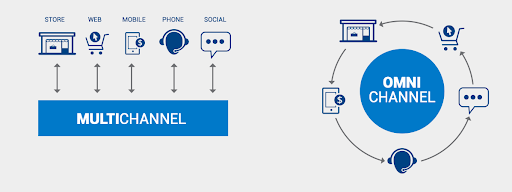
In a digital-first world, retailers want to make the online shopping experience as client-oriented as possible. If potential customers cannot seamlessly navigate your offerings, they are less likely to make a purchase.
According to Google statistics, 89% of profitable companies believe that providing an assistive customer journey and anticipating customers’ needs are critical for exponential growth. For this very reason, establishing that a platform is, in fact, omnichannel is a must. A seamless experience contributes to engagement optimization, enables better service, provides actionable data, and meets high customer expectations. In short, a retail customer engagement platform may be the difference between a person scrolling through social media and a paying customer.
Where to focus:
- How many different channels do they offer
When identifying a potential platform to work with, it is important to ensure that it’s knowledgeable on and operates in all the channels that your business requires. It is crucial for your marketing strategy and budget to select an all-in-one solution that will allow your company to deliver messages onsite, on major messaging platforms, via emails, via push notifications, etc. For example, ContactPigeon is among the very few customer engagement platforms globally that support automations across 10 different marketing channels, both in-store or completely digital. - How many features the platform has in total
It is also crucial to identify the number of features that a platform offers and whether these features would benefit your business. Furthermore, it is always helpful to evaluate an engagement platform according to the clients that it works with.
Dangers if you ignore it:
- A platform claiming to be omnichannel but, in fact, is multichannel
While many businesses are multichannel (meaning they serve a variety of platforms, like a website and social media), an omnichannel platform integrates all these solutions to create a seamless shopping experience.
#5: Examine the platform’s pricing, but also ask for a custom quote
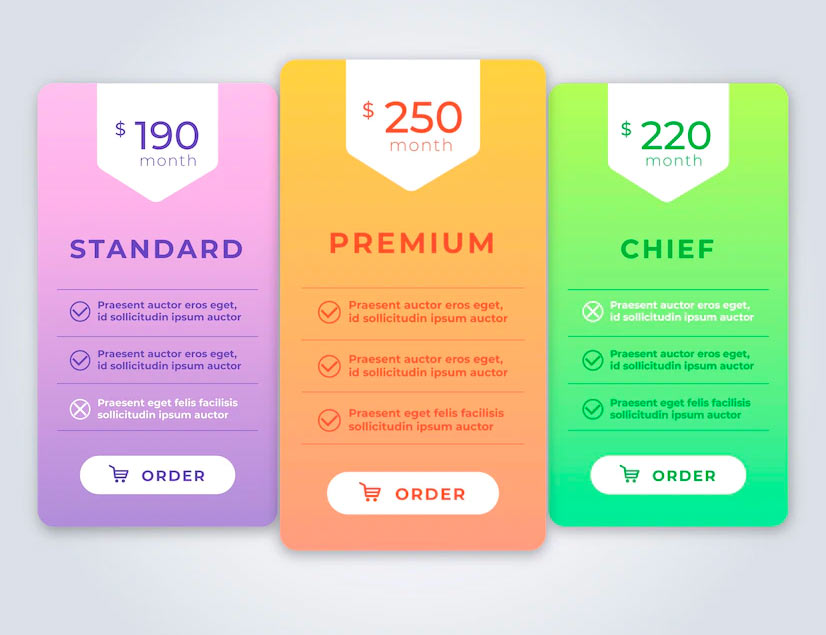
The COVID-19 pandemic has affected the way in which people spend their money, and this new phenomenon is sure to affect businesses’ income. It is always important for business owners to be money-savvy, but that’s especially true now as consumers start to think about spending less.
When looking for the right platform fit, it is, therefore, important to keep a budget in mind. It is also always beneficial to ask for a custom quote, which will likely cater to your individual needs.
Where to focus:
- A price package that fits your business
Engagement platforms usually have multiple payment packages to choose from. Even if a business cannot afford the most expensive package, there will likely be a package that suits its particular needs and budget. A retailer will always have the option to upgrade at a later stage if needed. - A pricing plan that ticks all the boxes
Apart from finding a price package that suits the business’s requirements, this plan must also include features and offerings that are beneficial to the business. Be on the lookout for a pricing plan that fits both your preferences and your budget. - If no pricing page exists, do not skip asking for a quote
Many companies prefer not to display pricing packages but this should not bother you at all. As long as the features & the reputation of the solution “ticks” your standards do not hesitate to contact them for a quote. This should not be a red flag for you, since some companies prefer to truly craft a personalized plan based on your business’ needs. In ContactPigeon, our demo presentation includes both a walkthrough of our platform and a customer engagement consulting session for your brand, even if you decide to move on with another customer engagement provider.
Dangers if you ignore it:
- A high price with a low number of features
Market research is important when looking for an offering that’s just right for your business. Beware of platforms that charge you an arm and a leg with little to no results.
#6: Examine what type of retail-focused customer engagement features they add and how frequently they add new applications

As a retailer, you should be on the lookout for a customer engagement platform that has specific retail and customer engagement features. Research shows, for example, that many customers expect retailers to have self-checkout features. eCommerce is one of the top retail-focused features that an omnichannel customer engagement platform should have. Ultimately, all features should allow a business to drive sales, increase efficiency and improve its client outreach.
Where to focus:
- The features offered
eCommerce solutions and web analytics are but two retail-oriented features that a customer engagement platform should have. When considering a prospective addition to your business team, ensure that the offerings meet your business and growth needs. - Examine their latest features
Read the company news of the solution you are considering to detect the platform’s evolution. For example, the more retail-focused features a solution adds, the more they understand the industry and its needs.
Dangers if you ignore it:
- Features unrelated to your business’s needs
It is not ideal to pay for features that your business does not need. Most platforms offer custom packages, and it is advisable to ask for a quote.
#7: Check what industry awards and distinctions your preferred solutions have won
Before proceeding to a collaboration with a customer engagement solution make sure to examine the awards and distinctions your potential partner has won over the years. There are numerous refined and esteemed organizations that evaluate SaaS companies based on their customer support, ease of use, efficiency, or performance.
Where to focus:
- Search for published posts, news, or press releases that announce the company’s latest distinctions
Every respectable company that has won awards from renowned establishments will surely announce it and leave digital breadcrumbs. Keep in mind to cross-check the awards with the organizations that nominate them, and do a thorough search in the company’s news sections for relevant articles. For example, ContactPigeon has acquired 10 new industry distinctions only in 2021.
Dangers if you ignore it:
- Teaming up with an unreliable company that will jeopardize your brand’s name
Word-of-mouth is everything in business, so choose your partners carefully. A reliable and trustworthy ally will not only help you in your day-to-day operations or increase your revenue but will also build your company’s image and branding.
Choosing the right retail customer engagement solution
Although needs differ by business and by industry, carefully considering customer engagement platforms will enable your business to invest in the proper solution. This may be a time-consuming process, but it remains crucial to growing your business.
Once you identify a promising platform, it is highly recommended that you get in touch with the business to start the evaluation and pricing process. This will ultimately help you decide whether the engagement platform is the right fit.
ContactPigeon has a complete omnichannel customer engagement solution, designed especially for retailers, business owners, and marketers that ticks all the boxes above. The platform’s advanced features are developed with the latest eCommerce best practices in mind, providing an omnichannel customer engagement software that streamlines the customer journey. Don’t hesitate to reach out to our trained executives for a free 30-min presentation.
Spending time on Linkedin? Follow us and get notified of our thought-leadership content:




